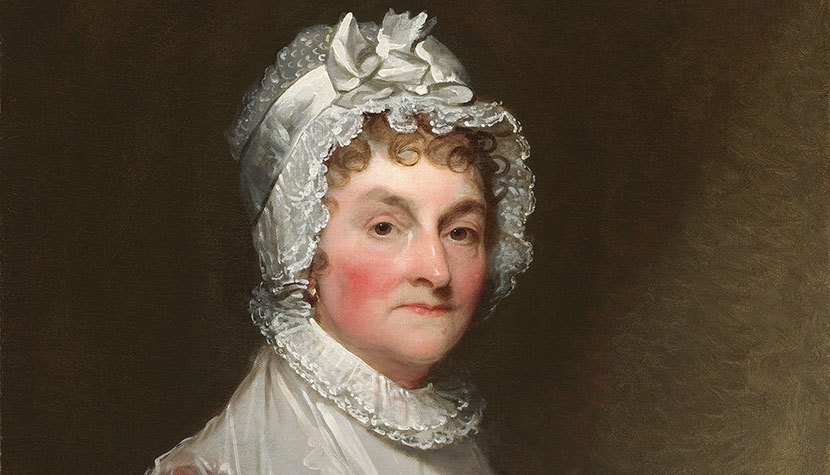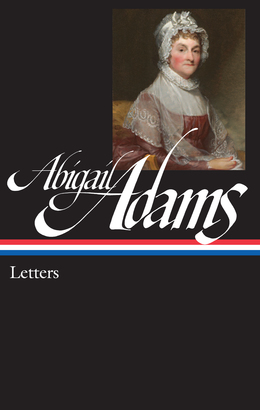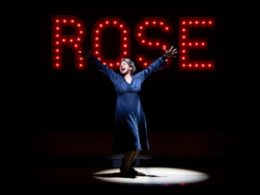This week Library of America proudly publishes Abigail Adams: Letters, a groundbreaking collection of 430 letters by the First Lady who was an extraordinarily insightful commentator on the American Revolution and the Founding Era. Below, we reprint in its entirety an especially noteworthy letter from Adams to her son John Quincy at a time when her family was beset by public and private calamity. Edith Gelles, the volume’s editor and the author of a number of works about Abigail Adams, provides some context for this remarkable document.

“The Spirit of party has overpowerd the Spirit of Patriotism,” observes Abigail Adams in her January 29, 1801, letter to her eldest son John Quincy, then American minister to the Prussian court in Berlin. Written after having learned that her husband John had been defeated for a second term as president, Adams’s letter vividly conveys the unsettled nature of American politics in the early republic.
The election of 1800 was perhaps the most vituperative in our history. Federalist John Adams, the incumbent, was despised by a prominent faction of his own party, the so-called Essex Junto. Alexander Hamilton, the de facto leader of the Federalist party, had written a pamphlet denouncing the President as a madman. This fratricidal conflict opened the door for the two Republican candidates, Thomas Jefferson and Aaron Burr, who, by a fluke of the original electoral process established by the Constitution, ended up tied in the Electoral College, with Adams coming third. The deadlock shifted the decision to the House of Representatives, where it would take 36 ballots for Jefferson to secure election. Denied a second term, President Adams, in a move that was as controversial then as it would be today, made a series of “midnight appointments” in the final days of his administration, including that of John Marshall to be the Chief Justice of the Supreme Court. As the young nation prepared for the first transfer of power from one party to another, the outgoing First Lady despaired for the future.
Adams’s mood in this letter is melancholy for more personal reasons as well. She had recently arrived in the swampy new capital, the first First Lady to occupy what would become known as the White House. On her journey to Washington, over roads that were so rutted that “it was like a ploughd field,” she had passed through New York City to pay a “dying visit” to her beloved second son, Charles, who was fast fading from the effects of alcoholism. Not yet regarded as a disease, alcoholism was then considered a sign of personal weakness and a sin. She prays that Charles, the son she remembers as the charming and loveable man “he once was,” will be forgiven, and that John Quincy will become a surrogate father to his younger daughter. Abigail and John took Charles’s older daughter, Susanna, home with them to Quincy, Massachusetts, where she remained until her marriage in 1817.
Abigail’s ray of hope in this grim landscape is the prospect of John Quincy’s return home and a fantasy of retirement “passed in Peace and quietness,” surrounded by her family.
To John Quincy Adams
Washington Jan’ry 29 1801
My dear Son
Your Brother Thomas has performed the painfull office of announcing to you the death of your Brother Charles. With what a weight of sorrow is my bosom opprest, when I reflect, that he was cutt down in the bloom of Life, in the midst of his days. he is numberd with the dead; it becomes me in Silence to mourn; mourn over him living, I have for a long time, and now he is gone.—the tender remembrance of what he once was rises before me, and I wish to forget. I wish to draw a veil over all those propencities, which have rung my Heart, with unutterable pang’s. I would hope, that from that Throne of Sovereign Mercy, where I have often besought it for him, he may have obtaind forgiveness—think of him my Son with the compassion of a Brother, and if you are permitted to return to your native Country, be a Father to the little Girl who bears my Name—the other I have taken, and if my Life is Spared, I mean to bring her up,—the Mother has no means of Support but that which She derives from her Friend’s She is amiable and worthy; I can lay no blame to her Charge. She attended with constant and unwearied Solisitude, to the last Scene, his Sickness was short; his constitution was undermined; his Sufferings were Severe, his patience under them was great, a dropsey in his Chest was the cause of his Dissolution; I knew not that he was Sick: indeed he had not been more than a week confined, when I arrived in November at Newyork, on my way to this City, I went to see him but you may judge of my feelings, when I Saw that his case was desperate, tho he entertaind no Idea himself that it was so, but he Survived only a fortnight. he was at Lodgings. your sister Smith who had Spent the Summer with me, returnd to Nyork when I did. She removed him immediatly, and every kind care and Sisterly attention was Shewn him, both from the Col. & herself. the removal of him, was all the releaf, all the consolation I could derive; I came to this city with a heavey Heart; in daily expectation of his death, which took place on the first of december; my Residence in this City, has not Served to endear the World to me, to private and domestick Sorrow, is added a prospect of publick Calamity for our Country. the Spirit of party has overpowerd the Spirit of Patriotism. the Intrigue of one Man, and the dissapointed ambition of an other has divided the Strength of the Country, and thrown into the antifediral Scale the weight of Numbers; this Change has been produced by the practise of all those low arts of calumny, and falshood, which are the weapons of unprincipled Men, and the power of faction, the corrupt and infatuated members of it, have acted without any regard to right, or wrong, and the question with them has been who shall govern, not how they shall be governed; If as is expected a total Change of Men, and measures follow, universal confusion will be the concequence. The Election is not yet determined, for two candidates being equal, the House of Representitives must decide; if they stear from Scylla, they must wrecked upon Charibdis—what is before us Heaven only know’s time only can unfold—that ingratitude was considerd by the Athenians as a Sin; we are told could Athens produce stronger instances, than are to be found in our Country? You can trace the train of my thoughts, when you consider the wise and judicious administration of our Government for the last 12 years—when you view it rising in power at home, and respectability abroad, acquiring wealth, and oppulence daily; who but must lament, that this fair prospect is vanishing like the baseless fabrick of a vision—it would require a vol’m instead of a single Letter; to unfold to you, all the Machinations which have combined to produce this Change in the Administration; honest Men have been cheated, and duped, ambitious Men have Seen themselves, and their plots discoverd, and counteracted by a watchfullness which they could not elude; and were therefore determined to get rid off, at any hazard; If you received a Letter I wrote you, just before I left Quincy it will Serve you, in Some measure as a clue to the objects of a certain Party call’d the Essex Junto, but a pamphlet written by Hamilton concerning the public conduct & Character of John Adams President of the united States, and which I presume has been sent you, will more fully display the falshood and malignity of the Anglo Federalist. from this pamphlet however the Author has not acquired more fame, or reputation than he did from the precious confession of an other; to Burr is the merrit due, with the antifederal party for turning the Election of Nyork in their favour. to Burr then will that party owe their President, provided mr Jefferson is chosen—and this was a bargain and Sale buisness!! Is it not sufficent to give every considerate, and reflecting person a surfeit of Elective Governments, when in this young Country and thus early such proffs appear of corruption and want of principle?—
I turn from this disgusting object to one nearer my Heart. I mean the return of my dear Son to his family and Friends my last letter was full upon this Subject; tho it will be urksome to you to return with Such prospects opening before you; I presume you will not feel as tho you could remain abroad;
I expect to take a final leave of this City next week, and return to Quincy; could I be assured that the remainder of my days might be passed in Peace and quietness, I should have reason to rejoice in a liberation from public Life; The President retains his Health, and his Spirits beyond what you could imagine; he has the conscienciouss of having served his Country with pure intentions; with upright views and from the most disinterested motives, as his own pecuniary affairs manifest. tho free from debts, or embarassments of that nature; his income will oblige us to a strickt oeconomy, in order to preserve that independance upon which Our future tranquility rests. I repine not, at any of the allotments, or dispensations of providence; we have been a scatterd family if some of my Children could now be collected round the parent Hive it appears to me, that it would add much to the happiness of our declining Years; Thomas has determined to remain in Pennsilvana he is the joy of our Hearts. his conduct in all respects, is prudent and judicious I think it not unlike that the State he has chosen for his residence may become under the new administration Such a hot bed of turbulence and Sedition as to induce him to change his Quarters; Some recent Changes have taken place in the public offices. mr Wolcot has resignd, and mr dexter is appointed in his place; Mr Marshall is appointed Chief Justice of the united States in the Room of mr Elsworth, resignd. Mr Griswold is this day nominated in the place of mr Dexter; Secritary of War. no Secretary of State is yet nominated and I cannot say that any will be; it is difficult to get Such Gentlemen as are esteemed proper, to accept offices from which they may be removed in the course of a few weeks—Yet in the present critical State of the Country when it is undetermined, and altogether uncertain which of the candidates will be our future President, or whether there will be any Election at all, the President has thought it best to fill up the offices with Such men as are fit, and capable of discharging the duties of them in any Event; if they are to be removed; let the world See how they will again be filled.
I have not any Letter from you of a later date than July 11th, I have seen Letters from Louisa to her Father in August and to the 5 of Sep’tr. Your Brother has Letters of as late a date from you which have been a source of much entertainment to me; I have very little cause to accuse you of not writing to me. I have myself been very deficient. tell Louisa that her Family are all well Situated about one mile from the Presidents house, but Such a quagmire between, that our intercourse is much impeeded. Caroline has had a long fit of Sickness, a Nervious fever from which she has so far recoverd as to have Spent one Day with me. I expect the Family all to dine with me on Saturday for the last time. Col. Smith is now in an office which affords him and his Family a handsome Support. my mind is easier upon their account. mr W. Cranch will do very well here. he is appointed one of the city Commissoners—my paper obliges me to conclude. Your truly affectionate &c &c.




